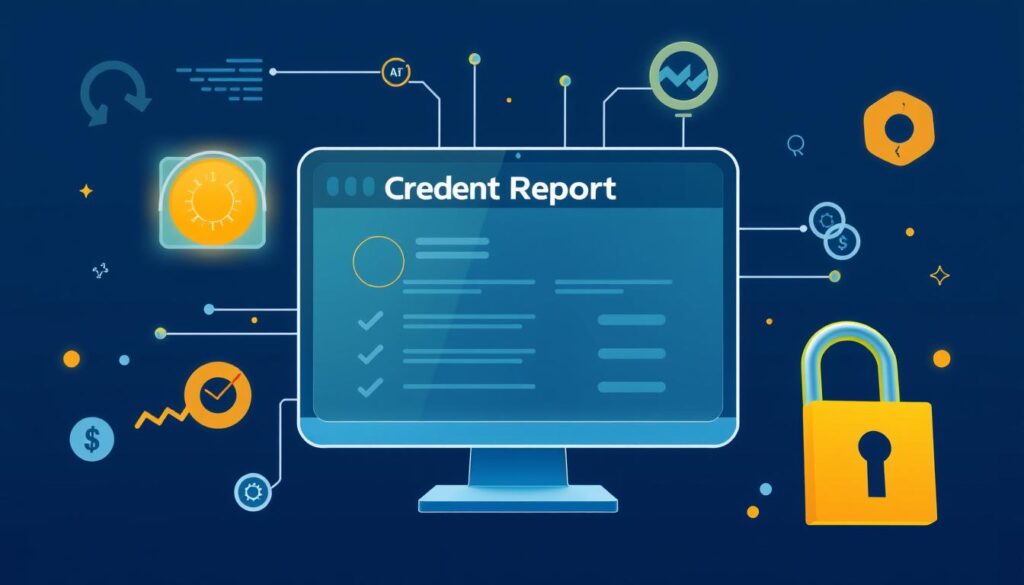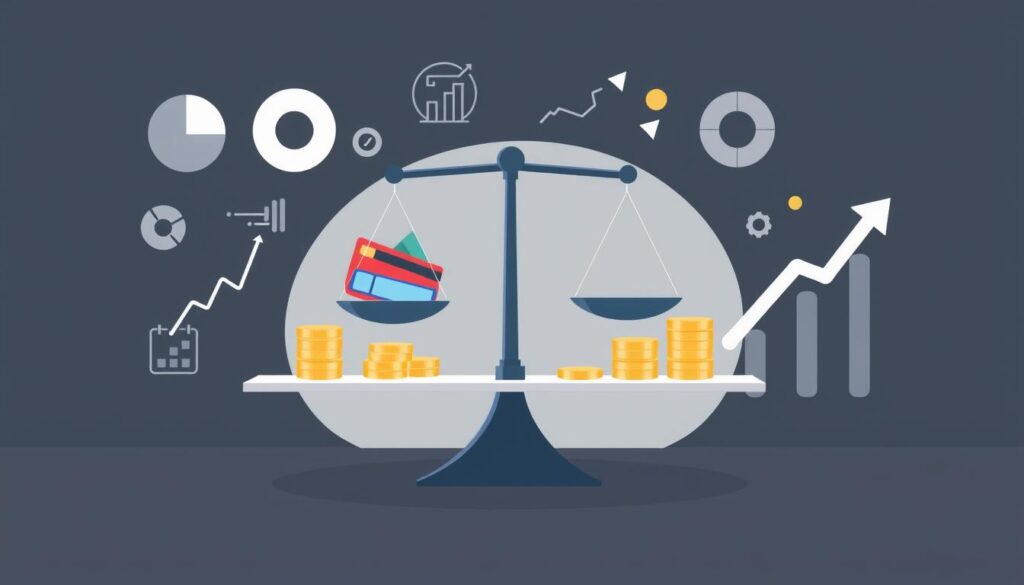Managing your credit report is vital for good financial health. Many wonder if they can remove closed accounts from their credit report. Let’s explore this topic further.
We’ll examine how closed accounts affect your credit score. We’ll also look at legal limits on removing them. Finally, we’ll discuss strategies for disputing errors and talking with creditors.
Key Takeaways
- Closed accounts can impact your credit score, but may remain on your report for up to 10 years.
- Legal limitations exist on removing closed accounts, but you can dispute inaccurate information.
- Negotiating with creditors may be an option for removing closed accounts in some cases.
- Monitoring your credit report and rebuilding your credit score are crucial after closing accounts.
- Understanding the statute of limitations and credit utilization ratio can help manage closed accounts effectively.
Understanding Closed Accounts on Your Credit Report
A healthy credit profile is vital for financial success. Closed accounts on your credit report can significantly impact your creditworthiness. These are credit accounts that have been terminated by the lender or consumer.
What Are Closed Accounts?
Closed accounts happen for various reasons. The account holder might request closure, or the lender may close it due to inactivity. Sometimes, accounts close when they reach their expiration date.
These closed accounts stay on your credit report for seven to ten years. The duration depends on the account type and closure reason.
The Impact of Closed Accounts on Your Credit Score
Closed accounts can affect your credit score in different ways. An account in good standing may still boost your credit history. It can also positively influence your credit utilization ratio.
However, accounts closed due to delinquency can harm your credit report closed accounts removal. They may negatively impact your overall creditworthiness.
Legal limitations exist on removing closed accounts from your credit report. Understanding these can help you manage your credit effectively. Explore options for deleting closed accounts on credit history to improve your financial standing.
“Closed accounts can have both positive and negative impacts on your credit score, depending on the account’s payment history and the reason for closure.”
Grasping the concept of removing closed credit accounts from report is crucial. It allows you to take proactive steps in cleaning up credit report closed accounts. This knowledge helps maintain a strong financial profile.
Reasons for Keeping Closed Accounts on Your Credit Report
Closed accounts on your credit report serve important purposes. They help prevent identity theft and give lenders a full view of your finances. These records are crucial for maintaining a comprehensive credit history.
Preserving closed accounts keeps your credit history intact. Lenders use this information to assess your creditworthiness. Removing these accounts could create gaps in your financial record.
Such gaps might raise concerns for lenders. This could affect your ability to get loans or credit cards in the future.
Closed accounts also protect against identity theft. They help flag suspicious activity if someone tries to open accounts in your name.
Consider the consequences before removing closed accounts. Consult a financial advisor to make an informed decision. Ensure your choice aligns with your long-term financial goals.
“Maintaining a comprehensive credit history is crucial for protecting your financial identity and ensuring lenders have a complete picture of your creditworthiness.”
can i remove closed accounts from my credit report
Legal Limitations on Removing Closed Accounts
The Fair Credit Reporting Act (FCRA) governs credit information reporting, including closed accounts. Credit bureaus can report can i remove closed accounts from my credit report for up to 10 years after closure. This applies even to paid-off or inactive accounts.
Exceptions exist for identity theft or inaccurate information. However, there’s no easy way to remove removing closed credit accounts from report outside these specific cases. The law requires credit bureaus to maintain accurate and complete histories.
Simply deleting closed accounts on credit history isn’t usually possible. Focus instead on how to get closed accounts off credit report and ensuring your report’s accuracy. Build positive credit moving forward.
You can dispute inaccurate or outdated information about cleaning up credit report closed accounts with credit bureaus. We’ll explain this process in the next section. For accurate closed credit account removal from report, concentrate on building good credit.
Disputing Inaccurate Closed Accounts
Spot any mistakes in your closed accounts on your credit report? You have the right to dispute them. This can help remove wrong closed accounts and boost your creditworthiness.
Steps to Dispute Errors with Credit Bureaus
- Review your credit report thoroughly to identify any closed accounts that are being reported inaccurately.
- Gather supporting documentation, such as account closure letters or payment records, to substantiate your claims.
- Contact the credit bureaus (Experian, Equifax, and TransUnion) directly and submit a formal dispute, either online, by mail, or by phone.
- Provide a detailed explanation of the errors and include the supporting documentation you have collected.
- Monitor the status of your dispute and follow up with the credit bureaus if necessary, as they are required to investigate and respond to your claim within a specified timeframe.
These steps can help you remove closed accounts from your credit report. This process can clean up your credit history. As a result, you may see a higher credit score.
Better credit can lead to improved access to financing opportunities. This can open doors to better loans and credit cards.
| Credit Bureau | Dispute Contact Information |
|---|---|
| Experian | Online: www.experian.com/disputes Mail: Experian, P.O. Box 4500, Allen, TX 75013 |
| Equifax | Online: www.equifax.com/personal/credit-report-services/credit-dispute/ Mail: Equifax Information Services LLC, P.O. Box 740256, Atlanta, GA 30374 |
| TransUnion | Online: www.transunion.com/credit-disputes/dispute-your-credit Mail: TransUnion LLC, P.O. Box 2000, Chester, PA 19016 |

Stay persistent when disputing closed accounts with credit bureaus. If your first try fails, don’t give up. Follow up or take it further.
A clear, organized approach can help you succeed. This increases your chances of closed credit accounts removed from your report.
Negotiating with Creditors for Account Removal
Closed accounts on your credit report can hurt your score. You might be able to negotiate their removal with creditors. This process needs careful communication and a smart approach.
The reason for the closed account matters when negotiating. Accounts closed due to missed payments are harder to remove. Mistakes or misunderstandings give you a better chance of removal.
- Gather all relevant documentation: Collect any paperwork or evidence that supports your case for account removal, such as payment records or correspondence with the creditor.
- Contact the creditor: Reach out to the creditor directly and explain your situation. Be polite and professional, and emphasize your willingness to work with them to resolve the issue.
- Negotiate in good faith: Offer to pay any outstanding balances or negotiate a settlement if necessary. This demonstrates your commitment to resolving the matter and may increase the creditor’s willingness to remove the account from your credit report.
- Obtain a written agreement: If the creditor agrees to remove the account, be sure to get the agreement in writing before taking any further action.
Negotiating with creditors needs patience and willingness to compromise. Follow these steps and keep communication open. This can help you remove closed accounts and boost your credit profile.
“Negotiating with creditors can be a tricky process, but it’s worth the effort if it means getting closed accounts off your credit report for good.”
The Statute of Limitations and Closed Accounts
The Fair Credit Reporting Act (FCRA) sets rules for closed accounts on credit reports. It’s crucial to know how long these accounts can affect your credit history.
Understanding the Reporting Timeline
The FCRA allows most negative items to stay on your credit report for seven years. This includes closed accounts, whether you closed them or the lender did.
Some exceptions exist to this seven-year rule. Accounts in bankruptcy may show up for ten years. Tax liens and judgments can remain for seven years from their filing date.
- Closed accounts can generally remain on your credit report for up to 7 years from the date of closure.
- Accounts included in a bankruptcy filing may be reported for up to 10 years.
- Public records like tax liens and judgments can stay on your credit report for up to 7 years from the date they were filed.
Knowing these timelines helps you manage your credit report better. You can ensure your credit history accurately shows your financial information.

Credit Repair Services and Closed Account Removal
Struggling to remove closed accounts from your credit report? A credit repair company might be the answer. These firms specialize in addressing inaccurate or outdated closed accounts on your credit history.
Credit repair services excel in understanding credit reporting laws and procedures. They can spot errors, dispute them with credit bureaus, and potentially remove closed accounts. This expertise is invaluable if you’re unsure about tackling closed accounts alone.
However, approach these services carefully. Some may make unrealistic promises or use unethical practices. Do your homework, read reviews, and understand fees before choosing a company.
Your decision depends on your situation and comfort level. Handling it yourself saves money. But if you’re overwhelmed, a reputable service could be worth the investment.
A good credit repair company can help clean up your credit report and get those closed accounts removed. They can be a valuable asset in improving your overall credit profile.
| Pros of Using Credit Repair Services | Cons of Using Credit Repair Services |
|---|---|
|
|
“A good credit repair company can be a valuable asset in removing closed accounts from your credit report and improving your overall credit profile.”
Rebuilding Credit After Closing Accounts
Closed accounts can hurt your credit score. But don’t worry! You can bounce back with the right moves. Let’s explore how to rebuild your credit after account closures.
Strategies for Improving Your Credit Score
Here are some powerful ways to boost your credit:
- Maintain a Healthy Credit Mix: Use different types of credit. This shows you can handle various financial responsibilities well.
- Practice Responsible Credit Utilization: Keep your credit card balances low. Aim for less than 30% of your credit limit.
- Monitor Your Credit Report: Check your credit report often. Look for mistakes about closed accounts and dispute any errors you find.
- Become an Authorized User: Join someone’s credit card with a good history. This can add their positive record to your report.
- Apply for New Credit Cautiously: Be careful when applying for new credit. Too many applications can lower your score temporarily.
These strategies can help you rebuild your credit over time. Stay patient and consistent in your efforts. Your credit score will thank you!

The Importance of Monitoring Your Credit Report
Keeping an eye on your credit report is vital. It helps maintain accuracy in your financial history. This includes proper reporting of closed accounts.
Regular checks let you spot and fix any errors. This ensures your credit history paints a true picture of your finances.
Monitoring your credit report provides several benefits:
- Identifying closed accounts still listed as open. You can dispute these and have them removed.
- Spotting unauthorized activity, like identity theft or credit report closed accounts removal attempts.
- Tracking credit score changes and understanding what affects it. This includes removing closed credit accounts from report.
- Ensuring accurate credit history reporting, including proper deleting closed accounts on credit history.
Regular reviews help you get closed accounts off credit report. This keeps your credit profile healthy and accurate.
Taking action can clean up credit report closed accounts. It also improves your overall financial health.
| Benefit | Description |
|---|---|
| Identify Inaccuracies | Spot errors or closed accounts on credit report that should be gone. You can dispute and fix these. |
| Monitor Credit Score | Track score changes and understand what affects it. This includes removing closed accounts from credit report. |
| Prevent Identity Theft | Catch unauthorized activity like identity theft or attempts to delete closed accounts on credit history. |
| Maintain Accurate History | Ensure your report reflects your true financial history. This includes proper closed credit accounts removal. |
Make checking your credit report a habit. It helps you tackle issues like can i remove closed accounts from my credit report.
Regular monitoring lets you keep your credit profile healthy and accurate.
Closed Accounts and Credit Card Utilization
Closed accounts can greatly affect your credit card utilization ratio. This ratio is key in determining your credit score. It’s crucial to understand how closed accounts impact your credit utilization.
Managing Your Credit Utilization Ratio
Credit utilization is the amount of credit you use compared to your total available credit. Lenders favor a low ratio, typically below 30%. This shows responsible credit management.
Closed accounts can make it harder to keep a good utilization rate. The credit limit of closed accounts still counts in your overall utilization calculation. This reduces your available credit, potentially raising your utilization ratio.
Here are strategies to manage your credit utilization with closed accounts:
- Keep older accounts open, even if unused, to maintain a longer credit history and higher overall credit limit.
- Avoid closing multiple accounts at once, as this can quickly drive up your credit utilization ratio.
- Request credit limit increases on your remaining active accounts to offset the impact of closed accounts.
- Regularly monitor your credit report and utilization ratio to identify and address any issues promptly.
| Credit Utilization Ratio | Impact on Credit Score |
|---|---|
| Below 30% | Positive impact, indicates responsible credit management |
| Above 30% | Negative impact, may indicate overextension of credit |
| Above 50% | Significant negative impact, signals potential financial distress |
Understanding closed accounts and credit utilization helps you manage your credit profile better. You can take steps to keep your credit healthy, even with closed accounts.

Preventing Closed Accounts from Reappearing
After removing closed accounts from your credit report, take steps to keep them off. Stay alert about your credit profile. This helps maintain accurate credit reporting.
Check your credit reports from Experian, Equifax, and TransUnion often. Look for any closed accounts reappearing. If you find issues, dispute them right away.
Set up alerts for changes to your credit report. This includes closed accounts coming back. Consider using a credit monitoring service. It can help you spot problems quickly.
- Set up credit monitoring alerts to notify you of any changes to your credit report, including the reappearance of closed accounts.
- Consider enrolling in a credit monitoring service that can help you stay on top of your credit profile and quickly identify any issues.
- Maintain open communication with your creditors and ensure they have accurately reported the closure of your accounts.
To prevent closed accounts from resurfacing, avoid actions that might bring them back. Don’t apply for new credit or open new accounts. These can cause closed accounts to reappear.
| Action | Impact on Closed Accounts |
|---|---|
| Applying for new credit | May cause closed accounts to reappear on credit report |
| Opening new accounts | Can trigger the reappearance of closed accounts |
| Maintaining open communication with creditors | Ensures accurate reporting of account closure |
Stay watchful and monitor your credit reports regularly. Avoid actions that could undo your progress. This helps prevent closed accounts from reappearing and keeps your credit history accurate.
Conclusion
Managing your credit history involves understanding closed accounts on your credit report. The process isn’t always simple. Legal limits, information accuracy, and creditor negotiations all affect the possibility of removing closed accounts.
Grasping the impact of closed account removal can help you take necessary steps. You can dispute closed accounts with credit bureaus. This can aid in rebuilding your credit and maintaining a strong profile.
Managing your credit history is an ongoing process. With the right strategies and persistence, you can navigate these complexities. Remember, it’s possible to achieve your financial goals despite closed accounts on your report.

